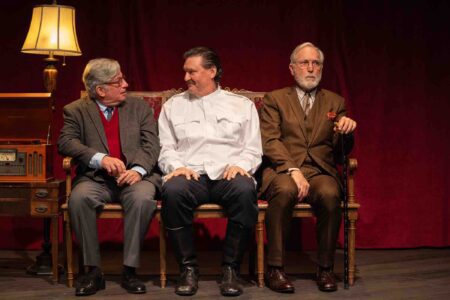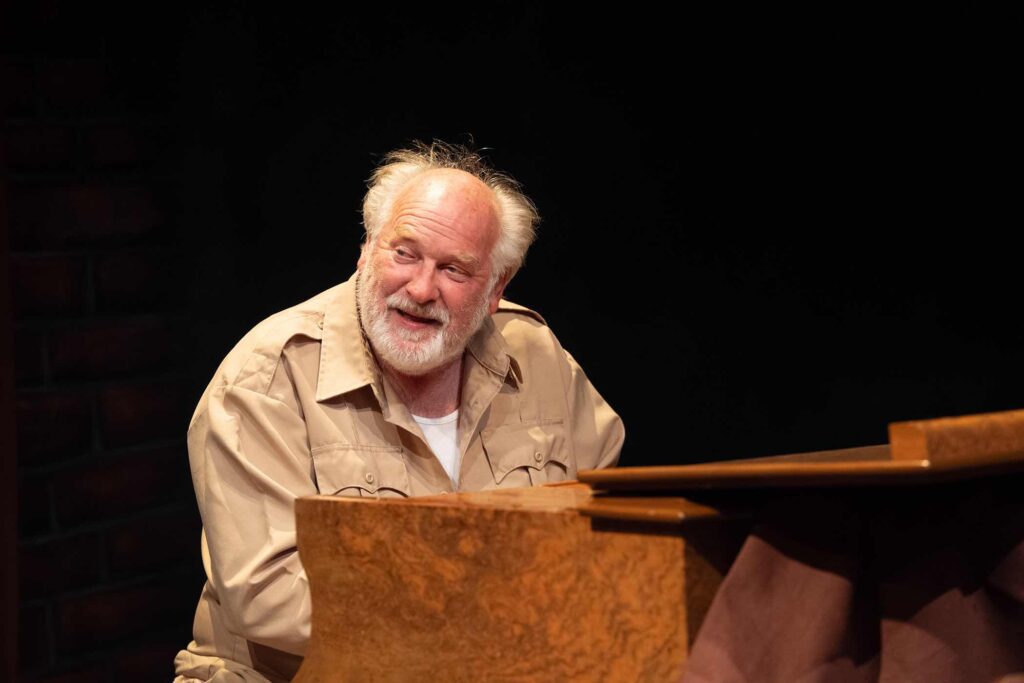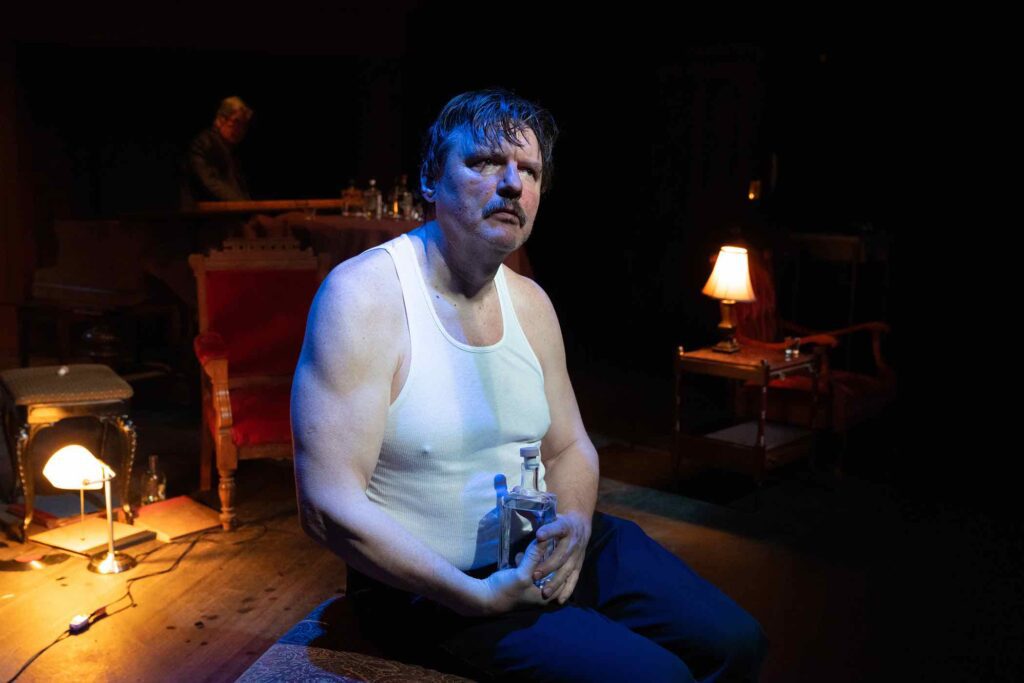Review: Stalin’s Master Class

| Location | Odyssey Theater, Los Angeles, CA |
| Date of Performance | June 2, 2024 |
| Language(s) | English |
| Photos by Jenny Graham | Amanda L. Andrei |
Reviewed by Amanda L. Andrei
A kick to a cane and a man falls to his knees. A command to sing and fear fills the singers’ eyes. These small cruelties inhabit the spacious room of Stalin’s Master Class as the full terror of the regime stays subdued.
The lion’s share of danger resides with the historical figure of Josef Stalin, the Georgian dictator responsible for the deaths of millions across Eastern Europe as he consolidated power into the former Union of Soviet Socialist Republics (USSR or Soviet Union), a world superpower from 1922 to 1991. By the time this play was written in 1984 by British playwright David Pownall, the dictator had been dead for thirty years, the Soviet Union was entering an era of decline, and Cold War tension ran high with nuclear threat.
Odyssey Theatre’s restaging of this satirical drama is a fascinating choice for 2024, as the memory of Stalin has faded, but global concerns over authoritarianism and populism remain high.
Based on events from a musician’s conference in January 1948 at the Kremlin, where Secretary of the Communist Party Andrei Zhdanov summoned musicians and music critics to deride their aesthetics and adherence to formalism, Stalin’s Master Class extends and fictionalizes the scenario further. Zhdanov (John Kayton) invites two composers, Dmitri Shostakovich (Randy Lowell) and Sergei Prokofiev (Jan Monroe), to a private audience with Stalin (Ilia Volok) at the Kremlin. And an invitation from an autocrat is never just an invitation.


In this case, the invitation meanders between philosophizing about the relationships between high and folk art, playing piano under threat, and eventually forcing a nightmarish creative jam session in an attempt to create a new Soviet culture. Director Ron Sossi finds the comic absurdist moments amidst the political palaver, revealing the true-to-life incongruity of regimes bent on hammering the arts into their agendas–and the awkward and soul-crushing failures that result. Dark crimson and iron reds in the plush furniture, sizable curtains, and a priceless icon (scenic designer Pete Hickok and prop designer Jenine Macdonald) likewise reflect the tension of an authority striving to maintain social realism while tempted by the bourgeoisie and royal taste.
John Kayton’s Zhdanov lives in this world of social realism and pragmatism, radiating his disgust with the composers in every shot of vodka he takes. Randy Lowell (as Dmitri Shostakovich) and Jan Munroe (as Sergei Prokofiev) portray artists under pressure with rapt silences and careful rebuttals, aware that they could be exiled at any moment. Relief blooms in the room when any of them sit at the piano to play—musical direction by Nisha Sujatha Arunasalam transforms their abstract discussions into emotion when they strike the keys.
It’s also noteworthy that offstage, Arunasalam plays the majority of the songs beautifully (alternating with pianist Michael Redfield, and with Lowell gracefully playing the Shostakovich sections).
The standout of this performance is Ilia Volok as Stalin. Humanizing a dictator is tricky territory, as it runs the risk of absolving a ruler of past atrocities that still haunt people and nations in the present. With an erratic mix of warmth, aggression, and stillness, Volok masterfully inhabits the despot with the cunningness and unpredictability of a coiled tiger, ready to strike the musicians at any moment. Neither absolved nor indicted, Volok’s Stalin—even in his most sympathetic moments—serves as a cruel and capricious symbol brought to life.
If only Pownall had written the musicians with more fear injected into them. Their trepidation remains mostly interior, save for an odd plot point where Shostakovich goes to a side bathroom and wills himself aloud to survive—then returns into the main room and uncharacteristically picks up the icon that had previously been mocked.
The imbalance of power—and the means of demonstrating it mostly through conversation—eases the sense of danger and real violence that the dictator could inflict upon the composers. Additionally, while it doesn’t happen often, some of the actors’ Eastern European accents slip into American ones, breaking the illusion of their characters. During intermission, and as I left the theater, I heard slivers of conversation about Putin, Ukraine, and world wars. It’s not merely Cold War shadows that still haunt us–It’s the ghosts of the current war. And as long as history keeps repeating itself, it seems that Stalin’s Master Class will keep enrolling.

Ioana Bîrjan (b.1997) is the author of Vârsta Iubirii which translates into English as The Age of Love (Heyday Books, 2023). The novel is inspired by the Lady of the Camellias and the opera La traviata. She earned a bachelor’s degree from the Faculty of Letters, Ovidius University of Constanța, where she is now a graduate student in the Romanian Studies program.
Read more of her work in magazines, in anthologies, and on her blog: https://scrierileioanei.wordpress.com/
SUPPORT SEEFEST
Not a member yet? Become an art patron with other SEEfest arthouse aficionados in support of great events and programs. Our mission is to keep you informed about initiatives from our wide network of fellow cultural organizations.
We Welcome YOU!

